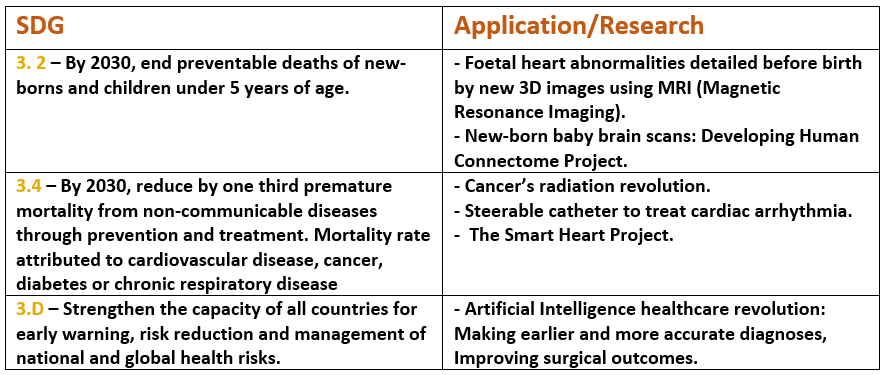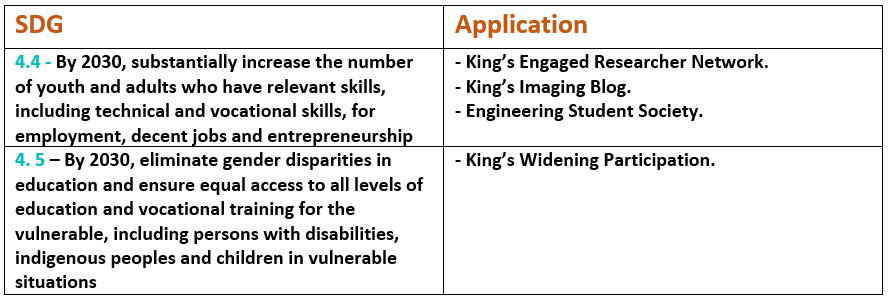This guest blog comes courtesy of Isabella Trujillo-Cortes, 3rd year Biomedical Engineering student at King’s who participated in the three-week micro-internship opportunity (organised by King’s Careers) with the King’s Sustainability Team in April 2019. This blog comes second in a series of three blog posts from Isabella.
The following 2 sections contain the desktop research I have gathered on the sustainability practices within two departments at King’s: The School of Biomedical Engineering & Imaging Sciences, and Estates & Facilities.
Mapping the SDGs: Biomedical Engineering at King’s
I attempted to match the information I found in the Biomedical Engineering Department website to the most appropriate SDG.
Evaluation
- The Biomedical Engineering department primarily targets SDG 3. The United Nations state that universal health coverage is integral in ending poverty and reducing inequalities. The department focuses on achieving this through their research and innovation in healthcare and medical technology.
- SDG 4 focuses on achieving inclusive and quality education, especially in developing regions. The university tackles this issue by giving students from low-income and disadvantaged backgrounds the opportunities to progress onto higher education.
The application for target 4.5 states King’s Widening Participation due to the fact that STEM (Science, Technology, Engineering and Maths) related subject streams are available to prospective students on the K+ and Realising Opportunities programmes. However, Biomedical Engineering is not specifically listed, thus, this could perhaps be an area of improvement.
- SDG 8 promotes productive employment, technological innovation, entrepreneurship and job creation.
In the Professional Issues module I recently completed, I gained an appreciation on project management, entrepreneurship, sustainability and ethics. I believe it has grown my professional development and some awareness of global issues. The module, however, is 0 credits and thus many students did not attend lectures. An incentive to encourage more students to attend could perhaps be an area to focus on.
- Investing in scientific research and innovation is a primary focus in SDG 9.
The department is well-known for their extensive on-going research in state-of-the-art labs and hence maps this SDG out well. Also, researchers themselves lecture many modules in the undergraduate and postgraduate courses. In doing so, students are more likely to then progress onto research and innovation themselves. - Due to the vast amount of energy used by computers and machinery it is important that the department focuses on responsible consumption and production as stated in SDG 12.
King’s sustainability department encourages sustainable labs across all departments who may use them. This focuses on areas such as control of fume cupboards, energy efficient management of cold storage, and recycling plastics.
To further encourage sustainable labs within the department, staff could become Sustainability Champions.
Interview with Paul Marsden (Development, Diversity & Inclusion Lead)
Most charities and sponsors are more likely to fund research projects and give grants to institutions who hold an Athena SWAN Award – many charities have this as a requirement. This acts as an incentive for the department to focus more on gender equality and inclusion. Many sponsors also require research projects to apply to developing countries. For example, technology must be widely used and accessible in all countries. This maps out SDG 9.
Furthermore, the department is involved in outreach activities organised by external companies: Nuffield summer programme, King’s Health Partner’s Summer School, Clinic Trials Day. These are aimed towards prospective students from under-represented backgrounds to encourage quality education for all – SDG 4. Other strategies, such as mentorships, are also being developed to support and encourage BAME students.
Along with the 2nd year Professional Issues module, the department also offers PhD training which focuses on social responsibility, ethics and engaging with industry.
Interview with Saad Qureshi (2nd Year Professional Issues Module Lead):
The professional issues module required students designing a business plan on a unique, biomimicry project (the application of nature to engineering). In this module, lectures focused on project management, ethics, and global sustainability issues.
The department’s aim in delivering the module, and teaching sustainability, was to develop student’s appreciation of nature and knowledge on social, economic and environmental issues. As biomedical engineering students, we are in a unique position to help tackle such issues. The project allowed students to develop their skills in sustainable design processes and eco-development. Saad explained that he hopes students will adopt a sustainable approach in our personal and professional lives.
The final part of Isabella's internship story will be published tomorrow, 17.1.20







